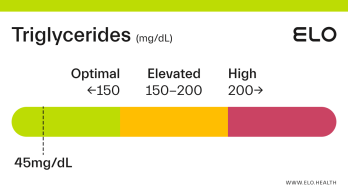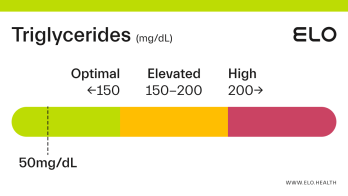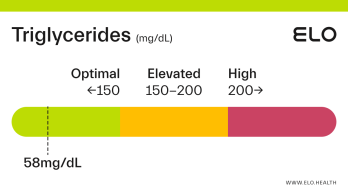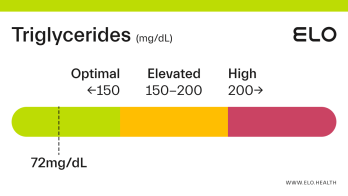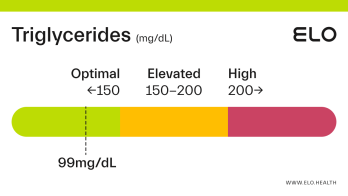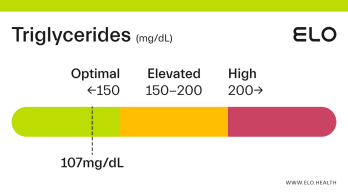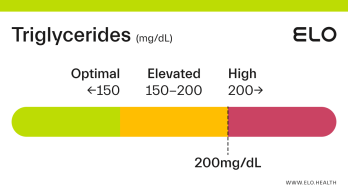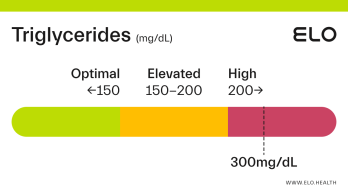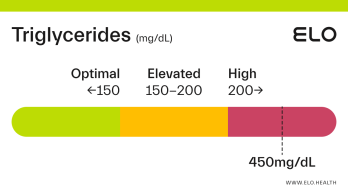Triglycerides overview

Contents
What is a triglyceride test? What does a triglyceride test measure? What do your triglyceride test results mean? What factors impact triglyceride test results? Groups at risk for high triglycerides Diet and lifestyle strategies shown to improve triglyceride test results Medications and supplements used to improve triglyceride test resultsWhat is a triglyceride test?
A triglycerides test measures the amount of triglycerides, a type of fat, in your blood.
What does a triglyceride test measure?
This test measures the level of triglycerides in your blood. They originate from fatty foods like butter, olive oil, and avocado, as well as unused calories (especially carbohydrates).
When you eat more calories than you need — whether from carbs, fat, or protein — your body converts that extra energy into triglycerides to store in fat cells. When your body needs energy between meals, triglycerides are released.
Like LDL cholesterol, triglycerides can build up in your arteries and increase your risk of heart disease, heart attack, and stroke. High triglycerides can also be a sign of metabolic syndrome, prediabetes, type 2 diabetes, or hypothyroidism. Extremely high triglycerides can cause pancreatitis, acute inflammation of the pancreas.
Triglycerides are often checked as part of a total cholesterol
What do your triglyceride test results mean?
Optimal: <150 mg/dL
Elevated: 150-200 mg/dL
High:
>
200 mg/dL
Optimal triglyceride results:
Optimal triglyceride levels are <150 mg/dL. Having optimal levels of triglycerides in the blood is associated with improved heart health and reduced risk of heart disease.
Elevated triglyceride results:
Elevated triglyceride levels are between 150-200 mg/dL. Diet and lifestyle changes may help you decrease your triglyceride levels to <150 mg/dL without medications, and lower your risk for coronary artery disease and stroke.
High triglyceride results:
Triglyceride levels above 200 mg/dL are considered high. High triglycerides are often a sign of other conditions that increase the risk of heart disease and stroke, including obesity, excess abdominal fat, high blood pressure, high blood sugar, and abnormal cholesterol levels. [2]
If your triglycerides are high, diet and lifestyle can help reduce your levels back into the elevated or optimal range. If these changes alone are not enough to lower your triglycerides, certain medications and supplements may help.
What factors impact triglyceride test results?
A variety of factors can affect triglyceride levels including your diet, weight, physical activity level, smoking, and alcohol. Some medications and certain diseases also impact triglyceride levels.
Diet: Diets that are high in fat, added sugar, and refined carbohydrates can increase triglyceride levels.
Weight. Having excess fat, particularly around the abdomen, can also increase triglycerides.
Physical Activity. Being active can help lower triglyceride levels.
Medications: Certain medicines can raise your triglyceride level including corticosteroids, beta-blockers, thiazide diuretics, antivirals, and estrogen.
Some medical conditions: Diseases involving the thyroid, liver, or kidney, as well as poorly controlled type 2 diabetes can change triglyceride levels.
Smoking: Smoking is associated with elevated triglycerides.
Excessive alcohol consumption: Heavy drinking can raise triglyceride levels.
Groups at risk for high triglycerides
Those with a diet high in fat, added sugar, and other refined carbohydrates
Overweight or obese individuals
Physically inactive adults
Smokers
Alcoholics
Individuals taking certain medications like corticosteroids, beta-blockers, thiazide diuretics, antivirals, and estrogen
Certain health conditions including hypothyroidism, liver or kidney disease, and poorly controlled type 2 diabetes
Diet and lifestyle strategies shown to improve triglyceride test results
To lower triglyceride levels:
Exercise for 30-60 minutes 5x/week.
Lose weight by reducing your calorie intake.
Avoid refined carbs and limit added sugars to less than <25g/day.
Limit alcohol consumption to <1-2 drinks/day.
Eat healthier fats like those found in nuts, seeds, avocados, olive oil, and salmon.
Avoid trans fats and limit saturated fat to <10% of total calories.
Quit smoking.
Medications and supplements used to improve triglyceride test results
If diet and lifestyle changes do not lower triglyceride levels enough on their own, some medications and supplements may help.
Medications
Prescription niacin: Niacin is a B vitamin that, when taken at prescription doses, can lower triglyceride levels and improve HDL (good) cholesterol levels. It works by blocking the enzyme responsible for making cholesterol in the liver.
Fibrates: Help lower high triglyceride levels and may also help raise HDL (good) cholesterol.
Statins: Statins (including atorvastatin, simvastatin, and rosuvastatin) may be prescribed if your LDL and total cholesterol levels are also elevated. Statins reduce cholesterol production in your liver and lower blood cholesterol levels. Statins are only prescribed if diet and lifestyle changes aren’t enough [3].
Supplements
Fish oil: The omega-3 fatty acids in fish oil can help lower your triglycerides. Prescription fish oil contains more active fatty acids than many nonprescription supplements but can interfere with blood clotting, so check with a doctor before taking a high-dose supplement.
References
Cholesterol Levels: What You Need to Know. (n.d.). U.S. National Library of Medicine | NIH. Retrieved September 9, 2021, from
https://medlineplus.gov/cholesterollevelswhatyouneedtoknow.html
Triglycerides: Why do they matter? (2020, September 29). Mayo Clinic.
https://www.mayoclinic.org/diseases-conditions/high-blood-cholesterol/in-depth/triglycerides/art-20048186
High cholesterol. (n.d.). NHS Inform. Retrieved September 9, 2021, from
https://www.nhsinform.scot/illnesses-and-conditions/blood-and-lymph/high-cholesterol
Cholesterol: Types, Tests, Treatments, Prevention. (2020, July 31). Cleveland Clinic.
https://my.clevelandclinic.org/health/articles/11920-cholesterol-numbers-what-do-they-mean
Blood Cholesterol | NHLBI, NIH. (2021, January 4). National Institutes of Health.
https://www.nhlbi.nih.gov/health-topics/blood-cholesterol
LDL: The “Bad” Cholesterol. (n.d.). National Institutes of Health. Retrieved September 22, 2021, from
https://medlineplus.gov/ldlthebadcholesterol.html

